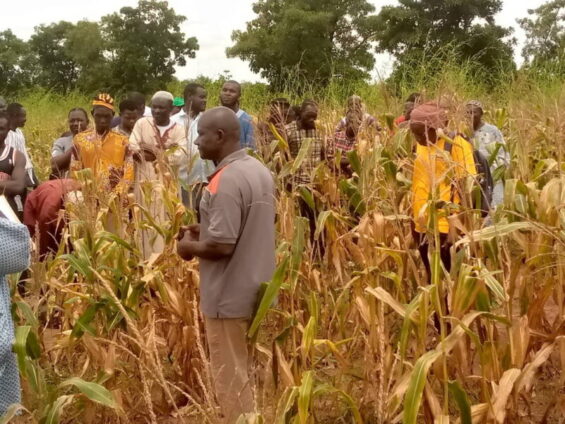
Audio By Carbonatix
The Savanna Agricultural Research Institute of the Council for Scientific and Industrial Research (CSIR-SARI) has introduced farmers in Manwe and Goripie in the Wa East District to stress-tolerant and hybrid maize varieties.
This introduction took place during a farmers' field day organised by CSIR-SARI in Manwe, where the farmers were acquainted with the benefits of these improved maize varieties. The demonstration fields showcased climate-resilient maize hybrids as part of the “Participatory On-Farm Testing of Stress-Tolerant Maize in the Upper West Region of Ghana” project, funded by the International Institute of Tropical Agriculture (IITA).
Addressing the farmers, Dr Mahama G. Yakubu, a Senior Research Scientist at CSIR-SARI, Wa station, noted that these demonstration fields were designed to facilitate the testing, promotion, and eventual adoption of the maize varieties by farmers. He emphasised the importance of adopting climate-smart maize varieties and hybrids to improve economic gains.
“Due to climate change, it is crucial to develop climate-smart hybrids. Climate-smart means the variety matures early, is stress-tolerant, high-yielding, and also meets consumer preferences to enhance livelihoods,” Dr Yakubu explained.
He added that the hybrids possess built-in tolerance mechanisms for water shortage, allowing them to produce more than traditional maize varieties during drought conditions. Additionally, several of these improved varieties have shorter maturity periods, which are better suited to the increasingly erratic rainfall in northern Ghana.
“With a stress-tolerant maize genotype, farmers are more likely to achieve food security, allocate less land to maize, and invest in other crops, promoting a more balanced diet, higher incomes, and improved soil fertility,” he stated.
However, Dr Yakubu, who is also an agronomist, advised that the yield potential of the hybrid maize varieties could only be realised if farmers adhered to good agronomic practices (GAPs), such as proper land preparation and timely weeding. Other essential GAPs he mentioned included the “4Rs” of nutrient stewardship (right source, right rate, right time, and right place), pest control, and timely harvesting.
Some farmers, who spoke to the Ghana News Agency (GNA) during the field visit, expressed optimism that the improved maize varieties would help them address the challenges posed by irregular rainfall patterns.
Latest Stories
-
Ghana’s global image boosted by our world-acclaimed reset agenda – Mahama
9 minutes -
Full text: Mahama’s New Year message to the nation
9 minutes -
The foundation is laid; now we accelerate and expand in 2026 – Mahama
29 minutes -
There is no NPP, CPP nor NDC Ghana, only one Ghana – Mahama
31 minutes -
Eduwatch praises education financing gains but warns delays, teacher gaps could derail reforms
44 minutes -
Kusaal Wikimedians take local language online in 14-day digital campaign
2 hours -
Stop interfering in each other’s roles – Bole-Bamboi MP appeals to traditional rulers for peace
2 hours -
Playback: President Mahama addressed the nation in New Year message
2 hours -
Industrial and Commercial Workers’ Union call for strong work ethics, economic participation in 2026 new year message
4 hours -
Crossover Joy: Churches in Ghana welcome 2026 with fire and faith
4 hours -
Traffic chaos on Accra–Kumasi Highway leaves hundreds stranded as diversions gridlock
4 hours -
Luv FM Family Party in the Park: Hundreds of families flock to Luv FM family party as more join the queue in excitement
4 hours -
Failure to resolve galamsey menace could send gov’t to opposition – Dr Asah-Asante warns
5 hours -
Leadership Lunch & Learn December edition empowers women leaders with practical insights
5 hours -
12 of the best TV shows to watch this January
5 hours

